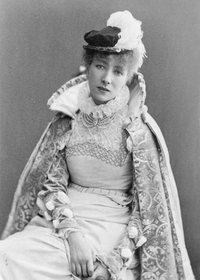Hernani
by Victor Hugo
Set in a fictitious version of the Spanish court of 1519, it is based on courtly romance and intrigues. Three men — two noblemen and a mysterious bandit — are in love with the same woman. What follows in the ensuing chaos of action prompted the biographer of Hugo, J.P. Houston, to write "... and a résumé [plot synopsis] will necessarily fail, as in the case of Notre-Dame de Paris, to suggest anything like the involution of its details".
Act I
In the first scenes Hugo introduces Don Carlos, King of Spain (the future Emperor Maximilian, and claims that Hernani is a member of his entourage, thereby allowing everyone to leave peacefully.
Act II
Don Carlos had overheard Sol and Hernani's plans to run away together, and accompanied with some aristocratic friends he appears at the rendezvous point, hoping to seduce Sol in Hernani's place. Doña Sol recognizes him and rejects him. Infuriated, Don Carlos attempts to abduct her. As Don Carlos and Doña Sol struggle over a dagger, Hernani arrives with his own sixty men having overtaken the king's three friends. He explains his hatred for the king over the death of his own father, and challenges Don Carlos to a duel. This time, the King is aware of Hernani's identity as a bandit, and he refuses a duel (as only noblemen could duel), but challenges Hernani to murder him. Hernani's sense of honor prevents him from attacking a man who won't fight back. The King escapes, and sends his men to arrest Hernani and his band of thieves. Hernani escapes after a farewell to Doña Sol.
Act III
Doña Sol and Ruy Gomez prepare for their wedding, and hear news that Hernani's men have all been murdered. Hernani arrives at the house in disguise, and Ruy Gomez takes him in as a guest. Hernani − apparently suicidal − reveals his identity and tries to provoke the servants to arrest him, but Ruy Gomez still insists on protecting him. Hernani admonishes Doña Sol for agreeing to the marriage, but when she reveals that she plans to kill herself on the wedding night, he has a change of heart and encourages her to accept the match. Ruy Gomez is appalled to learn of Sol and Hernani's relationship, considering it a betrayal of his hospitality, but he still continues his protection. The King arrives to arrest Hernani, but Ruy Gomez refuses to surrender him, citing laws of hospitality, which, he asserts, protect his guests even from the King. The King threatens Ruy Gomez, and Doña Sol intercedes for him. The King forgives Ruy Gomez but abducts Doña Sol. Alone, Ruy Gomez releases Hernani, initially intending to fight him to the death; but when Hernani learns of Doña Sol's abduction he insists on trying to rescue her and promises to surrender himself to Ruy Gomez after Sol is safe. Hernani secures his promise by giving Ruy Gomez a horn to blow to announce the moment when Hernani should die.
Act IV
Two months later, in June 1519, in Aachen (capital of the Holy Roman Empire), Don Carlos is awaiting the results of the imperial election while thwarting a conspiracy; among the conspirators are Don Ruy Gomez and Hernani. The latter, appointed to assassinate the king, refuses to give way to Don Ruy Gomez, who nevertheless asks him to break the pact. Don Carlos is elected emperor. He pardons the conspirators and announces the marriage of Doña Sol to Hernani. Hernani reveals his true identity: he is John of Aragon, noble but born in exile; and he abandons his idea of revenge.
Act V
Sol and Hernani are married, but, as they enjoy their wedding feast, Hernani hears the call of the horn blown by Ruy Gomez. As Hernani is about to drink poison, Doña Sol enters the room and tries to convince him that he is hers and he does not have to listen to her uncle. She is unable to persuade him otherwise. Doña Sol, shocked by Hernani's decision to kill himself, drinks half of the poison. Hernani drinks the other half and they die in each other's arms. Ruy Gomez de Silva kills himself.
